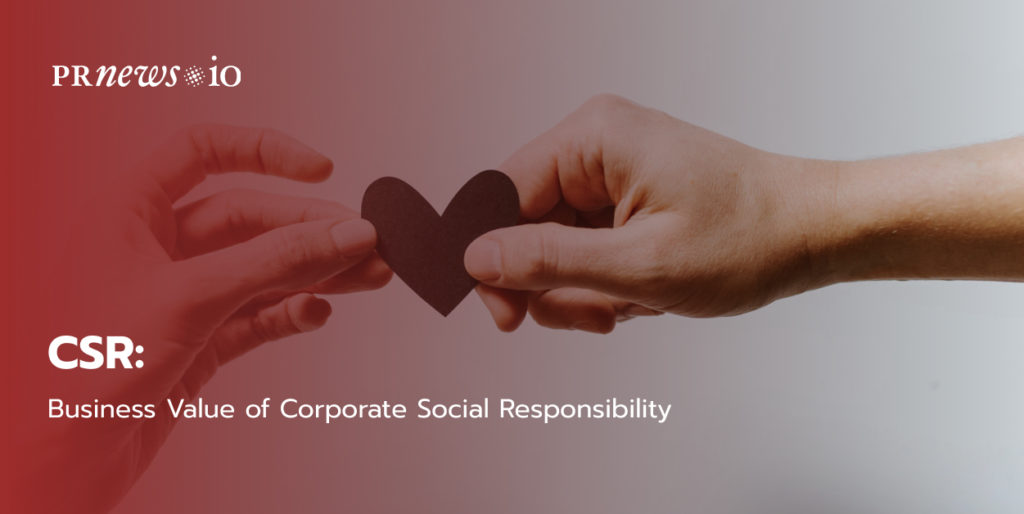
Corporate Social Responsibility (CSR) allows big and small companies to build positive change. It’s when brands choose to do what’s right not only for their commercial interest but also to build customer trust. Customers feel that when they use a product or service of a socially responsible company, they want to become a part of this useful activity. The more socially responsible the brand is, the more supportive its community and consumers are.
Here we’ll discuss what you should know about CSR programs and how they benefit a business.
CSR is meant to be a long-term investment to its customers in which the company operates. Customers grow more and more savvy each day, and due to social media, they are interacting directly with companies, for better or for worse. Consumers have certain expectations of companies in society, and in recent years, those expectations are very high.
Corporate social responsibility (also known as CSR) is a concept used to describe a company’s work to improve and help society in some way. These programs are based on the idea that businesses can reduce their harmful social and environmental impacts on the world. These activities may include donating money to nonprofits and implementing environmentally-friendly policies in the workplace.
Who does CSR impact?
CSR can help you strengthen your business performance, increase competitive superiority and build trust with customers and employees. It can also help you reach operational cost savings, by decreasing costs of wasted energy or unnecessary fees.
Perhaps most importantly, CSR gives your brand a positive image of a reputable ethical business.
CSR can improve and help companies, nonprofits, and employees alike. Corporate social responsibility is not an obligatory practice. It is something extra that companies do to become helpful to their local and global communities. This means that the general public can be influenced by CSR as well when they get to harvest the benefits of companies’ do-good efforts.
The purpose of corporate social responsibility is to return to society, take part in philanthropic events, and provide positive social value. Businesses are increasingly paying attention to CSR to make a difference and build a positive brand around their company.
Corporate social responsibility (CSR) contains many benefits that can be applied to any business, regardless of its size or sector.
The potential advantages of CSR to business include:
- better brand recognition
- positive business image
- increased sales and customer loyalty
- operational costs savings
- better financial performance
- greater ability to attract talent and retain staff
- organizational growth
- easier access to capital
And here are some more benefits, which are not so obvious:
Responsible business reputation
Corporate social investment can help you to build a reputation as a responsible company, which can, consequently, lead to a competitive significant advantage.
Companies often prefer suppliers who have responsible policies, since this can reflect on how their customers treat them. Some clients don’t just prefer to deal with responsible brands – they insist on it.
Costs savings
By decreasing resource use, waste and emissions, you can help our planet and save money too. With a few simple activities, you may be able to reduce your utility bills and achieve savings for your business.
Finding and keeping talented staff
Being a responsible, sustainable company may make it easier to find new employees or retain existing ones. Employees may be motivated to work longer, thus reducing the costs and disruption of recruitment and retraining new teams.
Other advantages of CSR to companies
By acting in a sustainable, responsible way, it’ll also help you to:
- receive finance – investors are more likely to support a reputable business;
- attract positive media attention;
- reduce regulatory burden – good relationships with local administration can often make doing business easier;
- find new business opportunities – for example, for the development of new products or services.
CSR and stakeholders
Your stakeholders are the persons or groups that have an interest in your business and are influenced by your actions. Different CSR strategies can help you influence positively on different groups of stakeholders, including:
- Customers: dor example, through fair and responsible business practices and good customer relations.
- Partners and suppliers: for example, by choosing your partners carefully, look at their labor, health, safety, and environmental practices.
- Communities. There are many options to create positive change in the community, for example, through supporting local events, taking part in charity activities, volunteering, etc.
Principles of CSR
There are some principles that we should consider, this is a must-have list for CSR.
First, CSR activities should be incorporated with the company’s mission and core values. But even more than that, CSR should be considered as corporate culture and a strategic planning process. When built-in the brand, CSR should be relevant to the company’s industry, meaning the strategy should have a viable relation to a brand’s core operation. If the CSR relationship is not perceived as consistent with the brand, then there are inconsistencies with authenticity and credibility. There must be stakeholder interest in CSR initiatives. As PR practitioners you have to be attentive and listen and respond to the needs of the stakeholders.
CSR should be part of the brand strategy, meaning it should be a daily focus. Not simply a random add-on. CSR should seek to improve the value created by CSR efforts and then leverage it to persuade stakeholders.
Next is evaluation. So it’s crucial to evaluate and critically analyze the programs of communication. This implies that communication objectives identify the root of the communication problem and that the research tactics are working in research.
At last, and this is part of strategic planning – CSR should be a long-term strategy that allows management to build positive relationships with stakeholders in the community.
Ultimately, CSR can positively influence a company’s perceived reputation. CSR develops a good reputation. Building brand image or equity through CSR is not at all about opening a checkbook, it is about opening a value-oriented philosophy as the foundation of a brand. Today’s consumers expect brands to help change the world even in the smallest of ways. It is common knowledge that a good company is a reflection of the quality, price, service, and attributes of a product that help differentiate one product from another.
All these are elements that make a business all that more appealing and influential to the consumers buying behavior. However, living in the information age, consumers often explore other factors as well as participation in the decision-making process. Customer buying behavior does not necessarily rely on product and service quality or pricing, but also on how ethical the brand has performed in producing its products and services.
A business with a good reputation must provide a positive impact on its owner and also ensure that there is no negative impact on the general public. It means that brands must contribute positively to society by spreading ethical values, especially in the broader social context. Thus, a positive association of the company with the general public will give you benefits. It has been shown experimentally that customer knowledge regarding an organization’s CSR activities may lead to a higher evaluation of the company and a more positive evaluation of the company’s product.
Content Marketing Platform
- 100,000+ media publications;
- get backlinks to your product;
- scale work with content distribution.
Types of Corporate Social Responsibility
There are many ways for CSR Implementation. Remember that the CSR activities have to be relevant for your business, so find what is more appropriate for your industry.
Corporate Philanthropy
Corporate philanthropy may be used when a brand promotes the welfare of others, usually through charitable donations of funds. Companies can leverage this type of CSR in different ways, though one of the most popular ways is by matching gifts their employees make to charity funds.
Brands that offer matching gift programs significantly increase the donations that their employees are giving to eligible organizations.
Corporate Volunteerism
Companies can leverage corporate volunteerism by motivating their employees to volunteer. Many companies allocate hours to go toward volunteering during the workdays, and many more encourage involvement by offering volunteer grants to the charity activities where their employees volunteer.
This kind of socially responsible program is a win-win for every participant engaged. Employees are seen volunteering and donating their time to important events in the community, and nonprofits are receiving free time and volunteer work, which is essential for the success of so many companies. Not to mention the reputation the business can build as they support local initiatives.
Environmental Leadership
Corporations can show environmental leadership in several ways. For example, they can:
- Put their efforts to reduce their carbon emissions
- Recycle their products
- Give back to environmental causes
By showing that they care about improving and preserving the environment, businesses can gain more support and business, and also build a positive image as environmental leaders.
Ethical Labor Practices
Part of being socially responsible for a business means participating in ethical labor practices. These practices can include:
- providing higher salaries and compensation packages to employees;
- offering better parental leave and vacation;
- giving tuition reimbursement.
Following ethical labor practices influence well on companies and result in more individuals wanting to work with them—and customers are eager to buy their goods or services.
Economic Responsibility
In being economically responsible, brands “pay their dues” to society. This is often done by:
- Keeping up with their taxes
- Investing back into their communities
- Paying their employees competitive wages
Businesses that take part in economic responsibility are truly paying it forward for the greater social good. This not only increases their values as a company but also their employees and the well-being of the economy overall.
How can CSR programs help nonprofits?
Individuals make up roughly three-fourths of a nonprofit’s total monetary donations. CSR initiatives can help charity funds make up that leftover 25% after they’ve looked to individual contributors. CSR also supports corporate volunteerism in the districts where employees live and work.
Measure the effects of your Corporate Social Responsibility
Many companies struggle to measure the impact of their corporate social responsibility (CSR) initiatives. Some of the benefits – such as customer loyalty and improved reputation – are hard to define and calculate, making it difficult to assess the value of your activities.
However, parameters to measure are highly important as it allows you to:
- disclose the importance of your activities to your stakeholders and clients;
- help taking decisions as you move forward with your CSR programs;
- line up your activities with business goals, for example, decrease staff attrition or develop staff skills.
By estimating the impact of your CSR, you can connect the value of your activities to your company’s bottom line. For example, you can start out activities in skill development with lower training costs, employee satisfaction with lower turnover rate, and even growth in sales leads that increases income.
How to evaluate the impact of your Corporate Social Responsibility?
Here are some ways to help you estimate your CSR success. You can:
- highlight your business against others – see measure performance and set targets
- get an appreciation for CSR best practice, by participating in responsible business awards or using measurement tools such as the BITC’s Responsible Business Tracker
- apply key performance indicators (KPIs) to estimate your environmental performance.
Remember that measurements will probably only show the immediate impact of CSR. The biggest benefit can be the long-term improvement in the image of the company.
Corporate Social Responsibility in Practice
Let’s see now how the big enterprises are implementing CSR to their PR strategy.
Starbucks

With a view to hiring, Starbucks wanted to diversify its workforce and provide opportunities for particular cohorts. They announced to hire 25,000 US military veterans and spouses by 2025 as part of its socially responsible activities. Ahead of schedule, the company achieved this goal six years early and now hires 5,000 veterans and military spouses every year.
In a further perspective to tackle racial and social equity, Starbucks has pledged a mentorship program to connect black, indigenous, and people of color (BIPOC) to senior leaders and invest in partnerships. The brand also pursue to have BIPOC represented at 30% in corporate roles and 40% in retail and manufacturing by 2025.
Johnson & Johnson

An excellent example of CSR is big pharma giant Johnson & Johnson. They have focused on lowering their impact on the planet for three decades. Their initiatives vary from leveraging the power of the wind to providing safe water to different districts around the world. Their purchasing of a privately-owned energy supplier in the Texas Panhandle empowered the company to reduce pollution while providing a renewable, economical alternative to electricity. The enterprise continues to seek out renewable energy options with the aim of having 100% of its energy needs from renewable sources by 2025.
Netflix & Spotify

From a social perspective, companies such as Netflix and Spotify offer support to their employees and their families.
Netflix offers 52 weeks of paid parental leave to the birth parent and non-birth parent and this includes adopted children as well. This can be taken at any time whether it is the first year of the child’s life or another time they choose. This is a lot better compared to a median of 18 weeks at other major tech companies.
Bosch

Bosch set itself ambitious goals for protecting the environment, with a goal to reduce their ecological trace through climate action, water usage, and a circular economy.
It seems this initiative has paid off and paved the way for other global companies, as 400 of its locations are now climate neutral. The brand now wants to focus on decreasing upstream (purchased goods and services) and downstream (product use) emissions by 15% in 2030.
Levi Strauss Company

Levi took initiative and began the well-being program for their workers. Levi’s partners with its suppliers and local organizations have started out programs and local communities on financial empowerment, health, family well-being, and equality. Programs launched in Bangladesh, Cambodia, Egypt, and part of this is because of globalization. The worker well-being program influenced 30,000 workers upon launch.
Later, the program broadened to 12 more countries and 100,000 more workers. Levi’s also helps organizations dedicated to fighting HIV/AIDS and other social issues like equality and equal rights.
Each of these brands is highly regarded for its CSR initiatives and continued efforts.
To Sum Up
There are many advantages of CSR. Brands establish good reputations, attract positive attention, save money through operational efficiency, minimize environmental effects, attract top and conscious talents and inspire innovation.
CSR matters for brands because if the community does not approve of how they do business, they may lose clients or see their reputations suffer. The news media and activist groups often watch businesses closely and are quick to share instances of irresponsible behavior.





